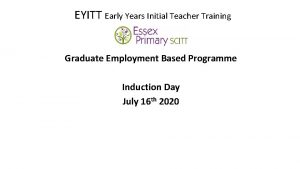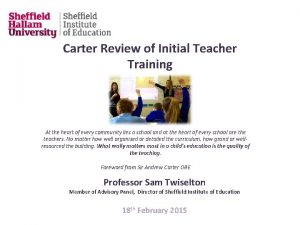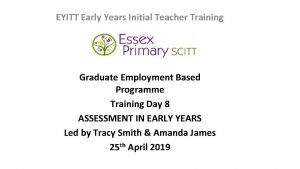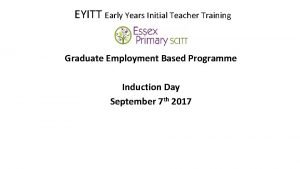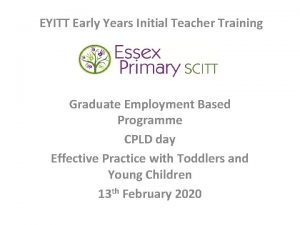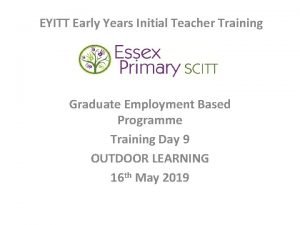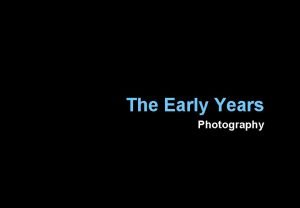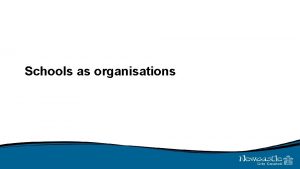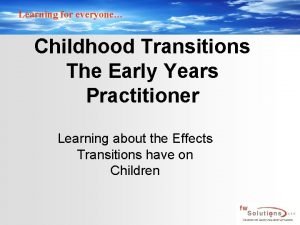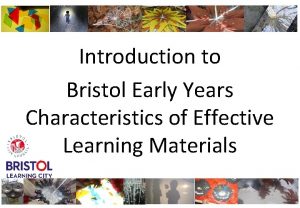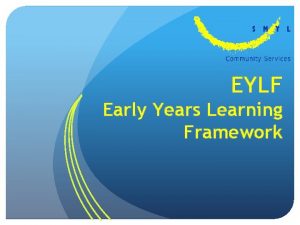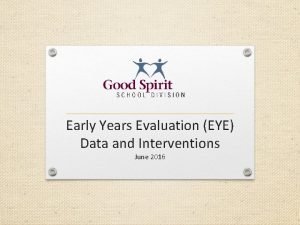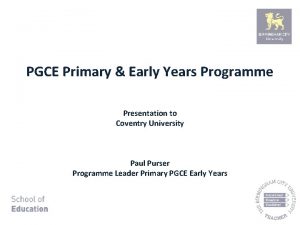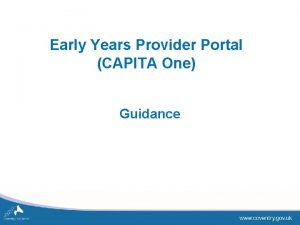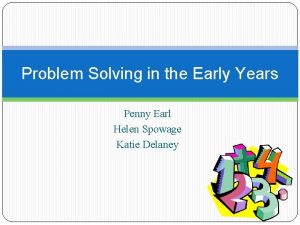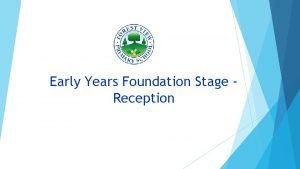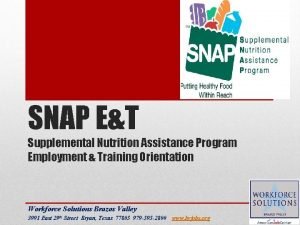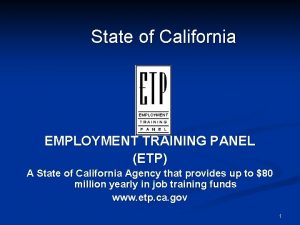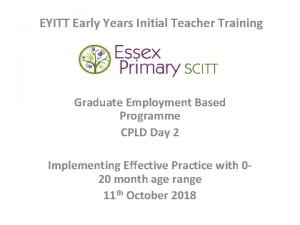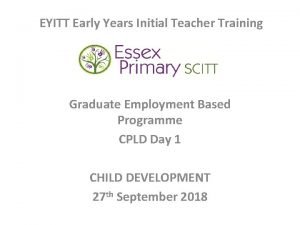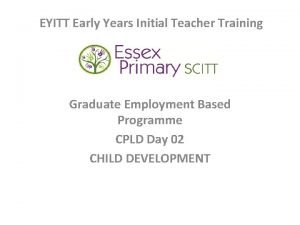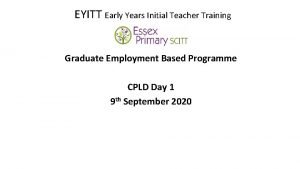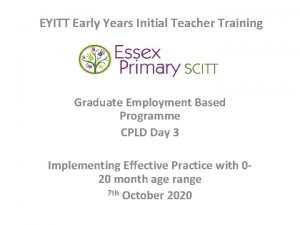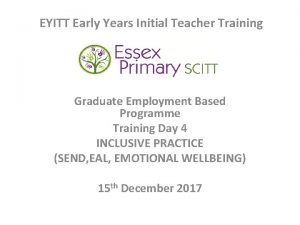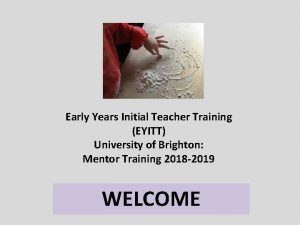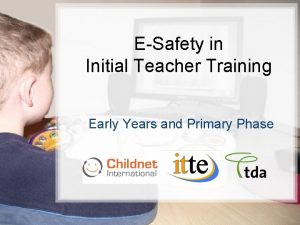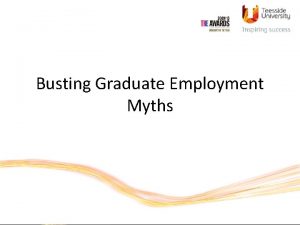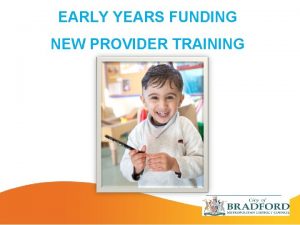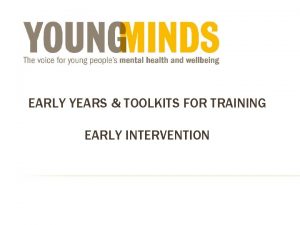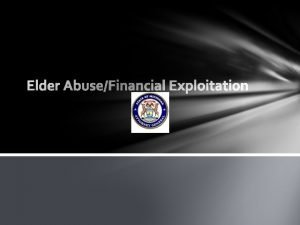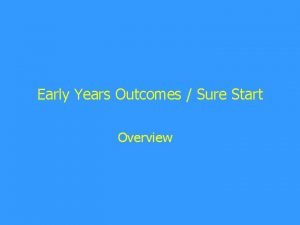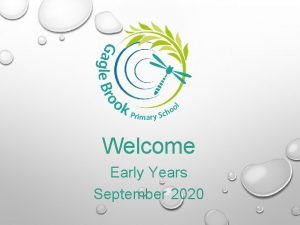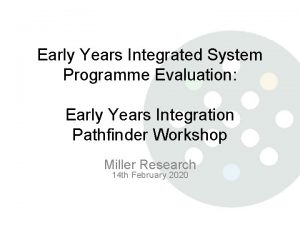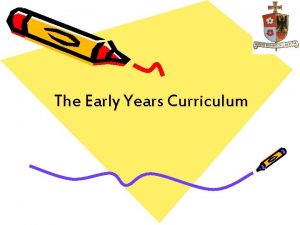EYITT Early Years Initial Teacher Training Graduate Employment


































- Slides: 34

EYITT Early Years Initial Teacher Training Graduate Employment Based Programme CPLD DAY 01 Standards in depth –reflection, managing change and evidencing impact 12 th September 2019 Led by Nicky Brewis and Amanda James

Objectives for the day… • Understand the placement requirements and expectations including for setting based mentors • Gain a deeper understanding of assessment requirements and processes • Have a deeper understanding of the Teachers’ Standards (Early Years) • Begin to critically reflect on current practice and make links to the teacher standards • To have completed self audit against the standards • Discuss individual development plan • Begin to develop the setting plan and understand it’s purpose • Start getting to know each other and share ideas!

Overview of the day Session 1 9. 30 am – 11. 00 • Introductions • Golden Rules! • Course information and overview Ø Placement information- requirements recap Ø Support systems- introduction to external mentors Ø Assessment overview Session 2 11. 15 – 12. 30 • In depth engagement with the Teachers’ Standards (Early Years) • Lunch 12. 30 -13. 15 • Session 3 13. 15 – 15. 30 • Self audit and Individual Development Plan • The Setting Plan • Questions

Contact details Lead Consultants: Amanda James amandajames@e. essexprimaryscitt. co. uk Tracy Goodway tracygoodway@e. essexprimaryscitt. co. uk Nicky Brewis nickybrewis@e. essexprimaryscitt. co. uk Lead administrator: Laura Short laura@essexprimaryscitt. co. uk Essex Primary SCITT Strategic Director: Fiona Willett fiona@essexprimaryscitt. co. uk

Expectations –developing professional practice Time management is key Organisation Ownership and responsibility Self Management Accountability Impact Leadership Professional Dialogue Openness and Honesty Effective Communication

Getting to know each other -developing professional practice Time to share with us information about: Ø Your setting Ø Your interests Ø Your areas of expertise Ø Areas that you would really like to develop

Golden Rules… Golden Rules

Programme Requirements - recap You must teach across all 3 age phases (babies, toddlers and young children) and engage with the educational continuum of expectations, curricula and teaching in key stage 1 and 2 (KS 1 2 week placement and day in KS 2) You must teach in at least 2 different early years settings/schools You must be employed in a setting offering EYFS throughout your training Your working timetable should be no more than 90% of the full time working hours of an Early Years Teacher

Additional teaching placement -recap • • 30 days (or equivalent in hours =180 hours) Beneficial experience to both trainee and the setting To be arranged by the trainee and the setting Make sure they read partnership agreement and sign the declaration- make sure they keep a copy, put a copy in your portfolio and send a copy to SCITT

Key Stage 1 placement requirements • In Spring term • 10 consecutive days • 1 day KS 2 • Make sure they read the partnership agreement and sign the declaration- make sure they keep a copy, put a copy in your portfolio and send a copy to SCITT

Reminder of guidance on placements: • You will need your DBS clearance before starting • Make sure you fill in the hours verification form and get it signed by member of staff • Be professional and abide by the setting’s policies and procedures • You are there to engage in, lead and support best practice. Any questions on requirements or placements?

Financial Incentive • This £ 7000 will be paid in 10 equal monthly instalments of £ 700 from October to July • This funding should be used towards the costs your setting incurs in supporting you to do the course e. g. release costs, travel costs, salary enhancements, resources • Make sure your setting keeps a record of how the funding is spent

Setting mentors Setting mentor support resources – explain the requirements and outline how setting mentors will support trainees through… • Regular meetings to review progress and agree actions to support development • Regular observations of trainee in practice • Joint observations with external mentors and input into progress reviews

Your external mentor will • Visit you 7 times – 6 observations • Give you advice, guidance and support • Encourage you to think critically and reflect on your own practice • Monitor your progress in meeting the standards • Contact you monthly via email / phone • Support you to develop action plans • Provide ongoing feedback and targets for further development

Assessment overview Written assignments/tasks Assessment observation visits • External mentors will complete 7 observation visits some will be joint with setting mentor • Tracking progress against Teachers’ Standards (Early years) supported by setting mentor • 5 visits to usual place of employment • 2 visits to additional teaching placement • Opportunity to review portfolio and action plan • • • Change Project –an action research project undertaken in your employment setting Additional placement task SST task Attachment task Maths tasks Phonics audit KS 1 and 2 tasks Leadership reflective log Tracking progress of individual children in one area of learning across the three age phases Other tasks as required Professional Portfolio • Trainees are required to provide 2 – 4 pieces of evidence per sub standard • Each piece of evidence should be clearly annotated and linked to the standards

Tracking a child Over the course of the programme: • Choose an area of development • Track a child in your setting in this area of development • Track a child in your Additional Placement in the same area of development • Gain an understanding of how this area of development transfers to the National Curriculum during your KS 1/2 experience • Use your reflections as evidence • No prescribed format for tracking • Place in the portfolio

Assessment criteria Criteria trainees are required to meet… • All 8 Teachers‘ Standards (early years) must have been met in practice • Trainees will have specifically evidenced the 0 -5 age range and the KS 1/2 continuum • Trainees will have specifically evidenced leadership of practice as in standards 6 and 8 • Trainees must provide evidence of their knowledge, undertanding and hands on practice with all three age groups: Babies – 0 -20 months; toddlers- 16 – 36 months and young children 30 -60 months

The role of an early years teacher standards preamble • Early years teachers make the education and care for babies and children their first concern • They are accountable for achieving the highest possible standards in their professional practice and conduct • Are graduates who are leading education and care • Have met all the standards in practice from birth to five

• Act with integrity and honesty • Keep knowledge skills up to date and are self critical • Forge positive professional relationships with parents/ carer’s in the best interests of the children

The standards 1. Set high expectations which inspire, motivate and challenge all children 2. Promote good progress and outcomes by children 3. Demonstrate good knowledge of early learning and EYFS 4. Plan education and care taking account of the needs of all children 5. Adapt education and care to respond to the strengths and needs of all children 6. Make accurate and productive use of assessment 7. Safeguard and promote welfare of children, and provide a safe learning environment 8. Fulfil wider professional responsibilities

Your Evidence Portfolio • 8 standards with a range of sub-standards in each • 2 -4 pieces of evidence per sub-standard • Every piece of evidence should have an annotation (about a paragraph) detailing what the evidence is, how it was implemented and the impact on your practice, a colleagues practice or a child’s progress • All evidence should be redacted • There should be few duplicates • There should be a range: Ø Photographs; reflective logs; planning; tracking; witness testimony; transcript; letters/leaflets; tasks; children’s work; certificates; staff meeting minutes • Include tasks/assignments • Use Reflective logs to detail specific elements of practice, theory, observation and reflect on the IMPACT. Intent, Implementation, Impact

Activity • 2 standards per group – explore amplifications and discuss specific sections that you think may be difficult to evidence • Identify as many ways as possible in which you may be able to evidence the sub standards… Observation, peer observations, setting mentor meetings, reflective log, portfolio, written tasks, change project, daily practice!!!

Lunch 12. 30 -13. 15 • Eat, drink and take a breath!

Leadership in the early years Leadership – a key aspect of being an early years teacher “leaders of effective settings were both reflective in their own practice and encouraged reflection in their staff” (Blatchford , 2000) “ A leader shapes and shares a vision which gives point to the work of others” (Handy 1992) Research studies emphasise the importance of effective leadership in early years • • EPPE (Effective Provision of Pre-school Education) ELEYS (Effective Leadership in the Early Years Sector) EPPSE (Effective Pre-school, Primary and Secondary Education) REPEY (Researching Effective Pedagogy in the Early Years) Leadership is about inspiring others to promote a shared vision Standard 8 – must provide evidence of leadership

Self-audit • Complete self audit and discuss in pairs outcomes of self audits – actions identified / strengths / challenges • Identify ways you might begin to evidence some of the sub standards • The self audit informs…the IDP / the setting plan / the change project and additional placement task and the range of evidence you may have

Introduction to IDP • • Rationale Sub standards Areas for development Leadership opportunities Actions Success criteria Milestones

Individual Development Planning • Working in groups begin to address how to complete the individual development plan • The IDP will be completed by the end of visit 1 with your external mentor

The Setting Plan • Rationale and example • In triads – introduce and share your setting plan • Discuss: What is effective?

Using the standards grid progress tracker As a. . . • Tool for tracking how you are providing evidence to each of the standards • Tool for identifying areas for further developing your practice • Actions identified – ways and ideas to ensure you effectively develop your practice • Basis for discussion with your course mentors

Leadership reflective log • You will be expected to make an entry at every CPLD day • This should then inform an element of practice back at your setting – this could be your practice or that of your colleagues • How you have used the reflections in your leadership log can provide valuable evidence • Either take an opportunity for leadership that you have identified on your IDP today or part of your Setting Plan and feed this into your reflective log

Website www. essexprimaryscitt. co. uk • Click on login • Select not registered and follow instructions • You will be able to login once your registration has been approved Resources and notice board

Pre Development Day Task Read the article that has been assigned to you: • Attachment Theory (Bowlby and Ainsworth) • Sustained Shared Thinking (Piaget and Vygotsky) • Language Development (Bruner / Chomsky) • Schemas (Piaget / Athey / Nutbrown) Be prepared to engage in critical discussion next session!

Review of CPLD DAY 1 • Understand the placement requirements and expectations including for setting based mentors • Gain a deeper understanding of assessment requirements and processes • Have a deeper understanding of the Teachers’ Standards (Early Years) • Begin to critically reflect on current practice and make links to the teacher standards • To have completed self audit against the standards • Discuss individual development plan • Begin to develop the setting plan and understand it’s purpose

To finish…. . .
 Early years teacher standards
Early years teacher standards Carter review of initial teacher training
Carter review of initial teacher training Eyitt
Eyitt Eyitt
Eyitt Eyitt jobs
Eyitt jobs Eyitt
Eyitt Banegas initial english language teacher education download
Banegas initial english language teacher education download Sheep years to human years
Sheep years to human years 300 solar years to lunar years
300 solar years to lunar years How long is “four score and seven years”?
How long is “four score and seven years”? Early years of william shakespeare
Early years of william shakespeare First photograph of a person
First photograph of a person Summarise types of early years provision
Summarise types of early years provision Medway early years
Medway early years Effects of transitions in early years
Effects of transitions in early years Bristol early years characteristics of effective learning
Bristol early years characteristics of effective learning Who did henry hudson sail for
Who did henry hudson sail for Sfyc hampshire
Sfyc hampshire Eylf meaning
Eylf meaning Eye early years evaluation
Eye early years evaluation Early adulthood characteristics
Early adulthood characteristics Pgce early years
Pgce early years Glasgow counts early years
Glasgow counts early years Coventry early years portal
Coventry early years portal Block play early years
Block play early years Pablo picasso early work
Pablo picasso early work Mark making reception
Mark making reception Partnership working in early years
Partnership working in early years Problem solving in early years
Problem solving in early years Families first hertfordshire
Families first hertfordshire Early years summit
Early years summit Nottingham city lado
Nottingham city lado Early years foundation stage pack
Early years foundation stage pack Snap employment and training program texas
Snap employment and training program texas Employment training panel sacramento
Employment training panel sacramento
